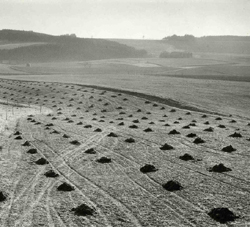|
Read Lee Blackstone's review in RootsWorld Sign up for Music of the Month
About the recording and the artists (in ther own words)
The Biologist’s Folk Songs: A Moravian Microcosm Rings to Adventuresome, Unconventional Life on "Dálava"
A thick tome, full of tunes and stanzas that once rang out over grain fields, flew over the tossing heads of dancers at village festivals, or slipped through half-open casements into lovers’ ears. Meticulously transcribed over 100 years ago by a biologist enchanted with the music of a small Moravian village at the western hem of the Carpathians.
The songs had been carefully preserved. But how could they come alive?
Dálava gives a beautifully idiosyncratic answer with their eponymous debut album. Based on the Moravian folk songs transcribed by biologist and ethnomusicologist Dr. Vladimir Úlehla, and led by vocalist Julia Ulehla (Vladimír’s great granddaughter) and guitarist Aram Bajakian, the album vibrates with intensity, even when whispering and spare. Prepared and distorted guitar alternates with eerie soundscapes. Ulehla’s voice teases and caresses (“Milá má”), then leaps and bounds (“Mamicky”).
“The song texts feel like fairy tales, like compact parables,” muses Ulehla. “They are so evocative of a whole miniature universe. We tried to give each song its own sound world. We knew nothing about the traditional way it was done at the time. It was simply a work of creativity and imagination. We were totally free.”
Bajakian has toured extensively with Lou Reed, learned from friend and guitar mentor Marc Ribot, and has worked with John Zorn and his circle to compose and perform challenging contemporary music (though often with a strong rock kick). He has also experimented with tender, more acoustically leaning treatments of Armenian folk tunes with his project Kef. Ulehla, classically trained at the Eastman School of Music, left the opera world for the uncharted, exploratory territory of the Workcenter of Jerzy Grotowski and Thomas Richards, drawing on the experience of the theater icon and his collaborators to dig deep into the physical experience and ritual mindset of songs in performance.
The two childhood friends crossed paths again as adults, meeting up in Italy where Ulehla was an actress at the Workcenter. Eventually, they found themselves back in New York together as young parents and curious musicians. They decided to tackle the love songs and philosophical ballads, the recruiting chants and cryptic fragments transcribed by Ulehla’s great-grandfather Vladimír.
His groundbreaking, methodical approach to the music of Strážnice—a single, highly musical Moravian village—raised the bar for folklore research in the region, in part thanks to Úlehla’s highly scientific mind and painstaking care in transcriptions. Not content to render tunes in simple 2/4 time, Úlehla’s melodies change meter, flirt with odd measures in 5/4, and generally exhibit the lively fluidity of a folk tune.
The reason for this precision is simple: For Vladimír Úlehla, songs were more than artifacts that could be pinned down on a page. They had lives of their own, evolving like organisms over the ages, shaped by their specific environments. “The measure count, the meter, the time duration for the delivery of individual notes or rhythm, and finally the emphasis and length of syllables—all of this combines into one integrated whole…” Úlehla wrote. “One can dismantle such a living whole, but its life will not survive… life is not at all found in the component structure, but in the relations of the components to each other, along with the relation of the complete organism to its environment.”
To find the life in these songs, Julia reached into her knowledge of Czech, digging into the language’s sound to access the appropriate emotional and timbral place. Bajakian’s guitar work evolved in a similarly organic way. “For each song, we played them, played around with them, and whatever came out, came out,” recalls Bajakian. “We went to visit Julia’s parents not long after we decided to work on this project together, and I brought this beat up old Kay guitar with me. I was experimenting with different sounds and decided to try prepared guitar.” So Bajakian stuck a couple bobby pins and an old business card in the strings, and laid the foundation for pieces like “Ej, lásko lásko.”
Unconventional—for renditions of Central European folk music, that is—sonic choices make the compact poetry of the originals crackle with life. Dálava incorporate surf rock and doo-wop, angular avant noise and lyrical strings. “Hory huc(á” sways between growling overdrive and a quirky waltz. “Aj, Jurenko” turns a fragmentary tale into meditative musical conversation full of twists and turns, highs and lows.
The conversation gains further substance thanks to the striking contributions of several musical friends. Zorn’s go-to bassist, and multi-instrumentalist in Yo-Yo Ma’s Silk Road Ensemble, Shanir Blumenkrantz, whom Bajakian has played with as part of ABRAXAS, adds the gimbri, with its treble jangle and booming percussive qualities, to “Ej, lásko, lásko, ” and “Lítala.” Two string players—Skye Steele (who has played with everyone from Anthony Braxton to the Nighthawks) and Tom Swafford (a composer and renegade Old Time player with experimental tendencies)—add layers that move effortlessly from earthy to edgy.
The resulting arrangements lay down a fertile ground for Ulehla’s unflinching, heartfelt voice. They remain true to the biologist song collector’s notion that songs are like organisms, adapting to and changing their environments. “Aram and I took that idea, and considered the songs as transplants,” Ulehla muses. “They are little seeds that had found their way across the sea and were transplanted in the craziness of New York.” Where they have blossomed into something utterly fresh.
|
Or make a one time contribution of 25.00 and get only the dálava CD Listen:
|
